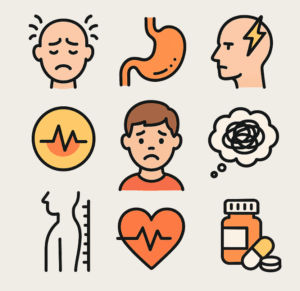Side Effects of ADHD Medications: What Clinicians and Patients Should Know
 Medications for Attention-Deficit/Hyperactivity Disorder (ADHD) can be transformative. Stimulants like methylphenidate, amphetamines, and lisdexamfetamine often provide dramatic improvements in focus, energy regulation, and day-to-day functioning. Non-stimulants like atomoxetine, guanfacine, and clonidine can be equally valuable in the right patient.
Medications for Attention-Deficit/Hyperactivity Disorder (ADHD) can be transformative. Stimulants like methylphenidate, amphetamines, and lisdexamfetamine often provide dramatic improvements in focus, energy regulation, and day-to-day functioning. Non-stimulants like atomoxetine, guanfacine, and clonidine can be equally valuable in the right patient.
But every intervention has a trade-off. While most side effects are manageable, some require careful monitoring and prompt action. Understanding these patterns is key to safe prescribing.
1. Common Side Effects of Stimulants
Stimulant medications increase dopamine and norepinephrine signaling in the brain. Alongside their benefits, they can cause predictable adverse effects:
-
Appetite suppression & weight loss
Particularly concerning in children, who may show slowed growth. Monitoring height and weight is essential. -
Insomnia
Difficulty falling asleep is common, especially with late-day dosing. Adjusting timing or switching to a different formulation often helps. -
Gastrointestinal upset
Nausea, abdominal pain, or stomach discomfort may occur, especially at initiation. Taking medication with food can reduce this. -
Headache
A frequently reported but usually transient side effect. -
Increased heart rate and blood pressure
Mild elevations are common, but in susceptible patients they can be clinically significant.
2. Psychiatric Side Effects
ADHD medications interact with broader psychiatric vulnerabilities.
-
Mood changes: Irritability, tearfulness, or “rebound dysphoria” as the dose wears off.
-
Anxiety: Some patients notice heightened nervousness or restlessness.
-
Tics: May emerge or worsen, though evidence suggests the risk is smaller than once feared.
-
Psychosis/mania (rare): At high doses or in predisposed individuals, hallucinations or manic symptoms may be triggered.
3. Long-Term Risks
Long-term studies suggest stimulants are generally safe, but vigilance is needed:
-
Growth suppression: Some children show slowed height/weight velocity; drug holidays or dose adjustments may be considered.
-
Cardiovascular strain: Rarely, stimulants unmask arrhythmias or cardiomyopathy in susceptible individuals.
-
Potential misuse/diversion: Particularly with short-acting amphetamines. Prodrugs like lisdexamfetamine reduce this risk.
4. Side Effects of Non-Stimulants
Non-stimulant medications are often chosen when stimulants are not tolerated or contraindicated. Their side effect profiles differ:
-
Atomoxetine
-
Nausea, stomach upset, decreased appetite.
-
Fatigue, sedation, or mood swings.
-
Rare: suicidal thoughts in adolescents (requires monitoring).
-
-
Guanfacine and Clonidine (alpha-2 agonists)
-
Sedation and fatigue are common.
-
Dizziness, low blood pressure, or fainting.
-
Rebound hypertension if stopped abruptly.
-
5. Managing Side Effects in Practice
The art of prescribing ADHD medication lies in balancing benefits with tolerability.
-
Start with the lowest effective dose and titrate gradually.
-
Review side effects at every visit—especially in the first few weeks.
-
Use growth charts, blood pressure, and pulse checks as routine.
-
Consider switching formulations (short-acting vs. long-acting) if specific side effects are problematic.
-
Engage patients (and families) in shared decision-making, explaining what to expect and when to seek help.
Conclusion
ADHD medications remain one of the most effective tools in psychiatry. Most side effects are predictable, manageable, and often improve with time. Rare but serious reactions highlight the need for careful screening, ongoing monitoring, and open communication between clinician and patient.
When handled with vigilance, ADHD medication doesn’t just reduce symptoms—it opens the door for individuals to thrive in school, work, and relationships.
✦ About the Author
I’m Dr. Srinivas Rajkumar T, MD (AIIMS, New Delhi), Consultant Psychiatrist in Chennai. At my Mind and Memory Clinic (Apollo Clinic, Velachery, Opp. Phoenix Mall), I specialize in ADHD management, integrating medication, behavioral therapy, lifestyle guidance, and advanced neuromodulation techniques like rTMS, tDCS, neurofeedback, and ketamine therapy.
📍 Mind and Memory Clinic, Apollo Clinic, Velachery, Chennai (Opp. Phoenix Mall)
📞 +91 85951 55808